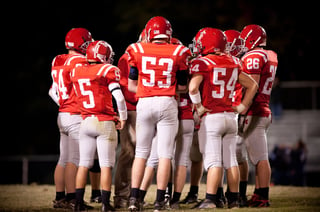 When it's time for a group or team to come together and work in synchronous harmony, frequently one leader makes a call, and the other members respond, doing their job as the leader planned it. Think about a system of clocks at a school, medical center or manufacturing facility: If those clocks were a football team, the master clock would be the quarterback. Like a quarterback is to a football team, the master clock is the most important member of a clock system.
When it's time for a group or team to come together and work in synchronous harmony, frequently one leader makes a call, and the other members respond, doing their job as the leader planned it. Think about a system of clocks at a school, medical center or manufacturing facility: If those clocks were a football team, the master clock would be the quarterback. Like a quarterback is to a football team, the master clock is the most important member of a clock system.
Master clocks have been around for a long time. At the start of the twentieth century, master clocks used paper tape and beads to keep time and send signals to other secondary clocks and bells – technology that lasted until the 1970s.
But oh, how times have changed. In the 1980s, electronic master clocks became the standard, with more programmable features, including battery backup and automatic changes for daylight saving time (DST). Today, master clocks have many features that control different facets of your facility and are smaller and more reliable than their predecessors.
Why Master Clocks are so Important
A master clock (or system controller) is critical to your timekeeping environment for many reasons. There are the obvious factors, like sounding bells when it's time for a shift change or when class ends. Master clocks also automatically adjust for seasonal time changes and for leap year. Think of that quarterback analogy again – DST is like calling an audible, and the team must adjust immediately to keep things running smoothly.
There are also lesser known qualities that make master clocks so critical. For example, they correct time automatically following a power outage. Master clocks also can be programmed to sound alarms, tones and horns to alert students, faculty and employees to certain events. Some master clocks can also transmit messages at specific times, and can be programmed to send information when schedules or events change from day to day. Master clocks can also control electrical functions like turning the lights on and off, which saves money.
Master Clocks: Functional and Reliable
Today, master clocks are loaded with functionality and are extremely reliable. Master clocks keep continuous, accurate time by acquiring it from various sources: the Ethernet, via cell phone towers (CDMA) and satellite (GPS). Master clocks operate with wired or wireless features, or as in the case of American Times' SiteSync technology: run both wired and wireless simultaneously. American Time also has master clocks that integrate with most existing clock infrastructures, so there is no need to completely change an entire system of clocks to match the master.
So now you know why master clocks are so important, just like the quarterback on a football team. The next time you see Tom Brady lead his team to victory, don't think of him as a great quarterback – he's a master clock.

